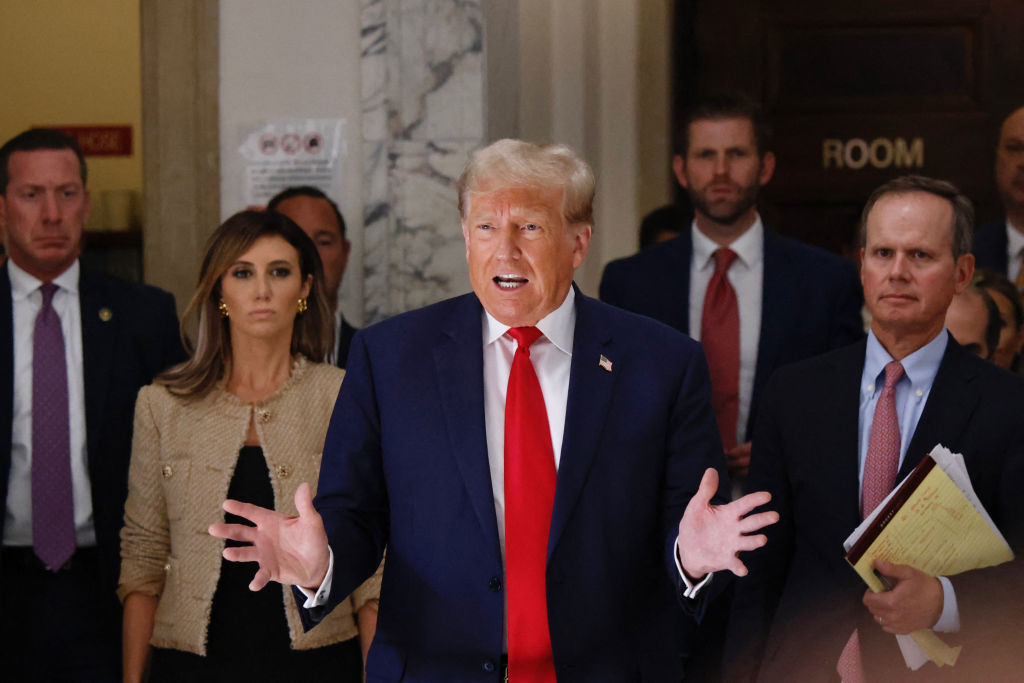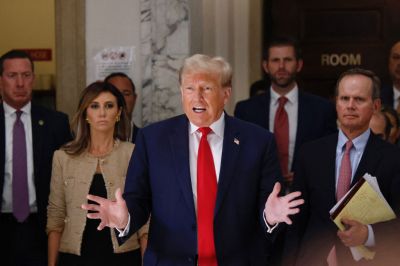Happy Thursday! What do CBS host Gayle King, beloved actor Tom Hanks, and YouTube star MrBeast have in common? Their likenesses are all being used, without their consent, in AI-generated advertisements—for a weight loss drug, a dental plan, and a free iPhone 15, respectively.
Quick Hits: Today’s Top Stories
- Senior Biden administration officials made a previously-undisclosed visit to Saudi Arabia last week to continue discussions on a deal that could normalize relations between Saudi Arabia and Israel, Axios reported Wednesday. The team—consisting of Brett McGurk, the administration’s Middle East adviser, and Amos Hochstein, the energy and infrastructure adviser—also discussed a possible Saudi-U.S. security deal and American support for a Saudi Arabian nuclear energy program.
- Officials from the European Union and U.S. reportedly met secretly with their Russian counterparts in mid-September in an attempt to forestall violence in Nagorno-Karabakh, an ethnically Armenian enclave of Azerbaijan. The meeting, which occurred in Turkey, marked a rare bout of diplomacy between Russia and the West, but ultimately failed to resolve the matter that led to Azerbaijan’s assault on the breakaway region. Meanwhile, Azeri President Ilham Aliyev signaled Wednesday that he will not attend peace talks with Armenia and the EU scheduled to take place in Spain later this week, due to the exclusion of the Azerbaijan-aligned Turkish President Recep Tayyip Erdoğan.
- The United States transferred more than a million rounds of seized Iranian ammunition to Ukraine earlier this week, U.S. Central Command announced Wednesday, amid concern over Ukraine’s supply of western weapons. CENTCOM naval forces seized the munitions in December 2022, as Iran was attempting to transport them to Yemen to arm Houthi rebels—in violation of a United Nations Security Council resolution. Meanwhile, Russia claimed Wednesday it had foiled what may have been Kyiv’s largest cross-border drone assault to date, shooting down 31 drones the night before.
- The average rate on a 30-year fixed mortgage surpassed 7.5 percent on Wednesday, the highest such figure since December 2000. The number of mortgage applications also sank to the lowest levels since 1995, as the mortgage application volume fell nearly 3 percent last week, compared to the previous week.
- More than 75,000 unionized healthcare workers employed by Kaiser Permanente went on strike Wednesday, marking the largest work stoppage of healthcare employees in American history. The striking workers—the majority of whom are on the West Coast, with additional stoppages in Colorado, Virginia, and Washington, D.C.—have vowed to stop work between one and three days over staffing shortages and wages. Employees participating in the strike included nursing staff, dietary workers, receptionists, optometrists, and pharmacists.
- President Joe Biden announced Wednesday an additional $9 billion in total student loan debt forgiveness for 125,000 borrowers through existing debt-relief programs, including the Public Service Loan Forgiveness. More than 50,000 borrowers who the Biden administration said were entitled to debt forgiveness, but were denied due to administrative errors, will now have their remaining balance canceled. Roughly 20,000 disabled borrowers will have their debt discharged.
- Twenty Republican senators—led by Sen. Rick Scott of Florida—reportedly said in a letter sent to Senate Majority Leader Chuck Schumer on Wednesday they would block any legislation in the Senate that did not relate to funding the government. As part of a last-minute deal to avoid a government shutdown, Congress passed a continuing resolution this past weekend that would fund the government for an additional 45 days—a move that ultimately cost House Speaker Kevin McCarthy his job. “We urge you to present a plan to the Republican Conference for how you intend to pass the remaining appropriations bills and conference them with the House in a manner that respects an open amendment process and which does not end in a December omnibus spending package,” the senators wrote in the letter.
- Three scientists—Moungi G. Bawendi, Louis E. Brus, and Alexei I. Ekimov—were awarded the Nobel Prize in chemistry for their work discovering and developing colorful quantum dots, semiconductors only nanometers wide. “Quantum dots now illuminate computer monitors and television screens based on QLED technology,” the Royal Swedish Academy of Sciences said in a press release. “They also add nuance to the light of some LED lamps, and biochemists and doctors use them to map biological tissue. Quantum dots are thus bringing the greatest benefit to humankind.”
- Kari Lake, failed 2022 Arizona gubernatorial candidate and close ally of former President Donald Trump, filed paperwork this week to run for Senate in Arizona with an announcement expected in the coming days. Sen. Kyrsten Sinema, an independent who is up for reelection, has not said whether she will run again for the job. Rep. Ruben Gallego is currently seeking the Democratic nomination. Republican Blake Masters, who lost a bid to oust incumbent Democratic Sen. Mark Kelly last year, has also floated a run for Sinema’s seat.
Trump’s Civil Fraud Trial, Explained

One of former President Donald Trump’s attorneys in his New York civil fraud trial brought her gaming laptop to the courtroom yesterday. The PC’s strobing lights of alternating colors offered quite the contrast to the stone-faced former president and his legal team seated at the table. But can we blame her? In a trial that centers on a decade’s worth of financial statements and accounting, who wouldn’t want to sneak in a game of Fortnite?
The trial kicked off this week with the drama and fanfare we’ve come to expect from a Trump courtroom appearance, with one major difference: One of the central claims of the case has already been decided. The case against the former president relies on the broad powers of a New York civil fraud law and threatens Trump’s control of his premier assets and his ability to do business in his former home state.
In February 2019, Trump’s former attorney and fixer Michael Cohen delivered dramatic testimony before Congress against his old boss, offering withering criticism of Trump and also of himself: Cohen said he had grown ashamed of what he did at Trump’s bidding. Part of that testimony included claims that Trump inflated the value of his assets and that the Trump Organization engaged in systematic fraud, setting in motion a New York state fraud investigation that culminated in New York Attorney General Letitia James’ current case against the former president.
James filed a civil complaint last September, alleging Trump committed fraud for years by inflating the value of his properties and other assets by hundreds of millions of dollars in order to receive better loan terms and lower insurance premiums. James brought seven counts (called causes of action) related to the alleged fraud, and named Trump, his sons Don Jr. and Eric, and two Trump Organization executives in the complaint, along with 10 Trump business entities used to control and operate commercial assets like the president’s New York golf clubs and Trump Tower.
The judge overseeing the case delivered a surprising defeat to Trump late last month, ruling against the former president’s motion to dismiss the case and partly in favor of James’ motion for summary judgment—the case is a bench trial decided by the judge, rather than a jury as often occurs in civil trials. Justice Arthur Engoron, in a 35-page decision, found that no trial was needed to assess whether the defendants were liable for the first count of fraud because the evidence—particularly, the financial statements Trump submitted to banks and insurance companies—obtained in the discovery process so clearly demonstrated that fraud had occurred. Consequently, he ordered the defendant’s New York business certificates to be canceled and some of Trump’s business entities to be placed in receivership.
The first cause of action is “essentially a ‘documents’ case,” Engoron wrote. “The documents here clearly contain fraudulent valuations that defendants used in business.” Evidence cited in the ruling showed that Trump regularly and consistently inflated his assets in statements of financial conditions (SFCs) to lenders and insurance companies—and not by paltry amounts. Trump claimed in SFCs that his Seven Springs estate in Westchester County was worth $261 million when four different appraisals valued it at $30 million or less. He also claimed his residence at Trump Tower was 30,000 square feet when it was actually only 10,996, and that it was valued as high as $327 million—which would have greatly surpassed the highest sale for a Manhattan apartment at the time, $88 million. “Defendants absurdly suggest that ‘the calculation of square footage is a subjective process that could lead to differing results or opinions based on the method employed to conduct the calculation,’” Engoron noted. “Well yes, perhaps, if the area is rounded or oddly shaped, it is possible measurements of square footage could come to slightly differing results due to user error. Good-faith measurements could vary by as much as 10-20 percent, not 200 percent.”
“A discrepancy of this order of magnitude, by a real estate developer sizing his own living space decades, can only be considered fraud,” he added. In total, Engoron found that Trump overvalued his assets between 2014 and 2021 by somewhere between $812 million and $2.2 billion.
Trump’s legal defense doesn’t refute the fact that the SFCs failed to match appraisals, but rather argues the discrepancies don’t matter. The former president cited so-called “worthless clauses” within the SFCs that he says effectively provide a giant asterisk to everything, including the financial statements. “I have a clause in there that says, ‘don’t believe the statement, go out and do your own work,’” Trump said in a sworn deposition. “This statement is worthless. It means nothing.” But Engoron rejected the claim, saying the clauses are not so broadly constructed as to allow for such outright misrepresentation as Trump included in the filings. What’s more, the judge argues, a disclaimer cannot protect “for misrepresentation of facts peculiarly within the defendant’s knowledge”—facts like the size of his own home.
The former president has also argued that valuations can be subjective, and that none of the lenders or insurance companies filed complaints against him or his businesses. Plus, given the mogul’s penchant for embellishment, it’s unlikely the companies placed much stock in the numbers. “The court disregarded the viewpoint of those actually involved in the loan transactions who testified there was nothing misleading, there was no fraud, and the transactions were all highly profitable,” Chris Kise—one of Trump’s attorneys—said in response to the summary judgment. Engoron admits as much: “Defendants correctly assert that ‘the record is devoid of any evidence of default, breach, late payment, or any complaint of harm.’”
But here lies the crux of the attorney general’s case against Trump: Under Section 63(12) of New York’s Executive Law, fraud doesn’t need to have caused damages or involve a victim for the attorney general to find a person or entity liable for fraudulent conduct. “This case is brought pursuant to a provision of New York law which gives extraordinary power to the attorney general of the state to seek broad remedies for fraud, or other conduct it can demonstrate is illegal,” Mark Zauderer, a New York commercial trial lawyer who has litigated 63(12) cases, tells TMD. “Unlike the ordinary fraud case, in which the party suing must prove loss, economic loss, this special law empowers the attorney general to ask for a court to grant both an injunction against the continuation of the conduct and a money remedy not based solely on the loss to the party suing, but rather focuses on the gain to the party benefiting from the proven fraudulent conduct.”
Fraud is defined broadly in 63(12) as “any device, scheme or artifice to defraud and any deception, misrepresentation, concealment, suppression, false pretense, false promise or unconscionable contractual provisions.” So long as James can prove repeated or persistent fraud, under this definition and appellate court precedent, she doesn’t have to prove intent or damages. She can still seek disgorgement, a clawing back by the state, of profits Trump made via the fraud. Hence, the attorney general is seeking a $250 million penalty—the amount her complaint estimates Trump gained from the fraudulent activity.
“[Letitia James] went for partial summary judgment because under just a plain, vanilla 63(12) action, there’s no need to prove intent or reliance or damages,” Cam Macdonald, executive director of the Government Justice Center, tells TMD. “Just the fact that these not even fraudulent acts, these false things, happened—because fraud, under anybody’s normal legal definition of fraud, there’s actually an intent, an action, a reliance, and damages.”
But if Engoron has already ruled against Trump, what is this week’s trial about? The summary judgment only addressed one of the seven counts included in James’ complaint. The court proceedings will sort through those counts as well as decide on the final penalties Trump could receive. Counts two through seven will be more difficult for James to prove, as they don’t rely solely on 63(12) and cite several criminal statutes which require her to demonstrate that the defendants intentionally committed fraud. The counts involve falsifying and conspiracy to falsify business records, falsifying and conspiracy to falsify financial statements, and committing and conspiracy to commit insurance fraud.
“Unlike a standalone cause of action under Executive Law 63(12), the second through seventh causes of action require demonstrating some component of intent and materiality,” Engoron wrote in his ruling. “There remain, at the very least, disputed issues of fact as to whether defendants violated these statues, intentionally and materially.” Proving intent is tricky in any trial, and there’s reason to think James could come up short. Manhattan District Attorney Alvin Bragg—the prosecutor pursuing a criminal indictment against Trump over a hush-money payment to Stormy Daniels—opted not to pursue criminal charges on the conduct at hand in the case. (Since this is a civil suit, James will have to meet a preponderance of the evidence standard, rather than the beyond a reasonable doubt criminal standard.)
Yet, the attorney general has already notched a significant victory on the first count—a win some lawyers argue reflects the excesses of Executive Law 63(12) more than legal justice properly meted out. “The courts then have allowed the attorney general to turn this into like this Thor’s hammer of a provision to bring people under investigation and haul them into court,” Macdonald says.
The image of an attorney general potentially wielding a mythical Nordic weapon against her political opponents is cause for justifiable concern. “It does give the AG a lot of power, there’s no doubt about that,” Evan Gotlob—a former federal prosecutor—tells TMD of 63(12). And from the day James won her office, she made it clear she wanted to scrutinize Trump. “I will be shining a bright light into every dark corner of his real estate dealings, and every dealing, demanding truthfulness at every turn,” the attorney general said on her election night in 2018.
Engoron’s ruling on the fate of Trump’s businesses strikes some conservative commentators and other observers as unprecedented and disproportionate to the wrongdoing at hand, particularly when there is no proof of damages to another party. “Whatever you think of Donald Trump, the existential punishment is wildly out of proportion with the negligible harm,” argued Andrew McCarthy, a former federal prosecutor and National Review writer. “For a non-crime, in which no one suffered harm—in which misrepresentations were made not to saps but to sophisticated financial actors who do their own due diligence on valuations.”
“The trial will now start, after the effective death penalty has already been imposed,” he added.
The so-called death penalty—the loss of business certificates—forces Trump to turn over control of some of his New York business entities that operate his properties to an independent receiver. But it’s unclear what that will mean for the assets themselves. Depending on the size of the penalty levied against Trump, some of the former president’s assets could potentially be sold. Trump’s attorneys asked Engoron last month whether his order would mean some of the properties would be sold, to which the judge replied, “I’m not prepared to issue a ruling right now but we will take that up in various contexts, I’m sure.”
Trump lambasted the case, saying yesterday, “They’ve weaponized justice in our country.” Over the first three days of the trial, he appeared content to treat the occasion like a political rally, attacking Engoron and James as pushing a Democratic scam. “This is a witch hunt,” he said. “This is just a continuation of the witch hunt that started the day I came down the escalator in Trump Tower. And it’s a shame for our country.” On Tuesday, Trump singled out one of Engoron’s law clerks, Allison Greenfield, posting a picture of her with Sen. Chuck Schumer to his Truth Social account, describing her as “Schumer’s girlfriend.” A spokesperson for Schumer said he does not know Greenfield and takes photos with thousands of constituents. The post drew a rebuke from Engoron, who ordered the former president to not publicly comment on court staff.
Trump left the proceedings on Wednesday afternoon, and his legal team has already filed an appeal of Engoron’s summary judgment. So far, the court has heard from accountants who worked with Trump’s businesses, but the trial will likely last for months. There are 28 people on James’ witness list that could be called to the stand—including Trump himself, Eric, Don Jr., and Cohen. The defense witness list includes 127 names.
Adding insult to legal injury, Trump’s business persona was dealt another blow on Tuesday: Forbes announced he had officially dropped off their list of the country’s 400 richest people.
Worth Your Time
- It’s getting harder and harder to recruit good teachers these days, and a large part of the problem seems to be the students themselves. Teachers feel “they [can] no longer hold students accountable academically or behaviorally because of pressure from snowplow parents and bad district policies,” Jessica Grose writes in her latest column for the New York Times. She includes jarring testimonials from teachers, who feel as though they cannot properly teach students who know that they cannot fail. “Failure is a bad word—and the kids know it,” says one teacher. “It takes way more work to hold a student accountable than to simply pass him/her. Even if a kid does nothing all year, we are encouraged to find a way to pass him/her. And then, of course, when a student does not perform, parents often want to know what we are going to do about it—not what their child can do.”
- The Philadelphia Phillies swept the Miami Marlins in the Wild Card round of the 2023 baseball playoffs. While shortstop Trea Turner is on a roll this postseason, he struggled for much of the regular season. Turner was supposed to be the Phillies’ star, yet he was batting and fielding like a Little League drop-out and was met with raucous boos by home crowds. Local radio producer Jack Fritz then offered a radical solution, as chronicled in a story by the Washington Post: a standing ovation. “Let me just say this: It can’t hurt, and what if it does work?” said Fritz. “It’s a good moment for the ballpark, a good moment for the city. You see the crowd rise up, and it turns into a little bit of a moment. And even if Trea doesn’t start going off or whatever, think about also what it does for the rest of the team? They know that we got their back. Sometimes tough love is necessary. Sometimes brotherly love is necessary. Time for that for Trea. Stand with Trea.” After the standing ovation, Turner batted .337 with 16 home runs and 42 RBI in just 48 games. For you non-baseball fans out there, that is really, really good.
Presented Without Comment
Fox 8: TSA Warns Travelers to Not Put Pets Through X-Ray Machines
Also Presented Without Comment
Fox Business: Prada Partners to Make Spacesuits for NASA's Artemis III Lunar Mission
Toeing the Company Line
- In the newsletters: Andrew and Drucker unpack Kevin McCarthy’s ouster in Dispatch Politics, Scott defends (🔒) Americans’ largely dim view of the economy as reasonable, Haley explains (🔒) how McCarthy’s embrace of partisan maneuvering paved the way for his downfall, Jonah argues (🔒) that a little less transparency in politics might not be such a bad thing, and Nick wonders whether (🔒) Democrats should have rescued McCarthy.
- On the podcasts: Sarah and David are joined by Lisa Blatt and Sarah Harris, two partners at the law firm Williams and Connolly, to talk about what it’s like to argue before the Supreme Court on the latest Advisory Opinions, while Jonah is joined on the Remnant by Jim Pethokoukis to discuss his new book, The Conservative Futurist.
- On the site today: Gary Schmitt reviews Franklin Foer’s new book about Joe Biden, and Audrey Baker explains Temporary Protected Status for Venezuelan migrants.
Let Us Know
Are Republican senators right to focus solely on legislation that deals with funding the government?








Please note that we at The Dispatch hold ourselves, our work, and our commenters to a higher standard than other places on the internet. We welcome comments that foster genuine debate or discussion—including comments critical of us or our work—but responses that include ad hominem attacks on fellow Dispatch members or are intended to stoke fear and anger may be moderated.
With your membership, you only have the ability to comment on The Morning Dispatch articles. Consider upgrading to join the conversation everywhere.